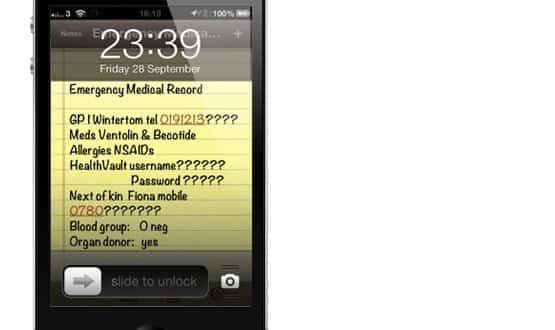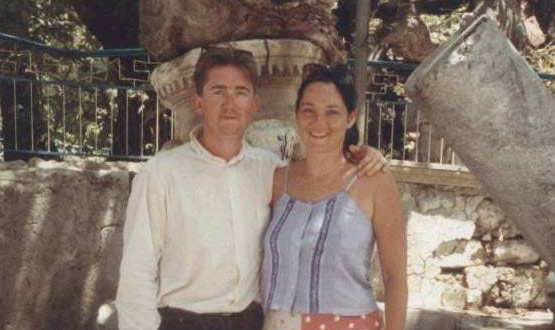Joe’s view of the Summary Care Record
- 9 October 2012

You find me busy preparing conference presentations. I’m speaking at the first CCIO Leaders Network Annual Conference, which is running alongside EHI Live 2012 (3.30pm on 7 November).
And I’m up at the National Mental Health Informatics Network event of the year the following week. So I look forward to seeing you in the flesh soon.
Perhaps we could debate the future of the Summary Care Record? I read in these pages that there will be 40m SCRs by 2015.
Going through my slides I found the one pictured above, which I have amended for sharing purposes (the real one has no question marks).
In other words, pending getting your own SCR you can make your own if you have an iPhone, write your vital information in notes, take a screenshot and set it as your lock screen and wallpaper.
This is a subject close to my heart. When I joined the National Programme for IT in the NHS I was encouraged to write a short statement about why I joined.
I told the true story of how two weeks before I got married I had been working in a hospital in Middlesbrough where I had received the telephone call from hell.
"Is that Dr McDonald?”
"Yes"
"I’m afraid your partner has been in a road accident. Her car hit an articulated lorry on the A66, she has a head injury and she is unconscious.”
I was in such a hurry to get to the Darlington Memorial accident and emergency department that I forgot to tell them that my partner, Fiona, is an insulin-dependent diabetic.
I remember hearing “Girlfriend in a coma” by the Smiths on the radio as I drove to Darlington. I passed the crash site on the way and her car was unrecognisable. Every panel was dented, it had obviously rolled and finished up on the middle of a roundabout.
Arriving in A&E I was shown to her cubicle, where she lay unconscious in the recovery position with an obvious bump on her forehead.
Presumably, this had been caused when she’d hit the steering wheel of the brand-new VW Polo she’d only had for two months. The nurse told me the neurosurgeons were on their way.
I touched Fiona’s hand. It was cold and clammy. She was hypoglycaemic. Not a disastrous head injury but a common cause of unconsciousness or altered consciousness which occurs when a diabetic has too much insulin and not enough sugar.
We administered an infusion of glucose and Fiona was well again within a few minutes. We married on time two weeks later and I took Fiona to the birthplace of modern medicine, the Asclepion (pictured) on the Greek Island of Kos for our honeymoon. I know how to show a girl a good time.

When I offered the opinion that electronic patient records seemed like a jolly good idea in these circumstances, I was stunned at the vitriol which poured onto eHealth Insider. One commenter suggested I’d invented the entire episode. Yes, I know.
Now, I admit I was incredibly naive about the National Programme for IT in the NHS and I did not understand how complicated solving the emergency medical information problem could be.
But I had not expected there would be opposition to solving the problem. I had failed to grasp how passionately people felt about the issues. As usual there are several tribes.
The Privacy Zealots
The privacy zealots hold to the absolutely pure version of patient confidentiality and see it as a sacred duty, passed down from Hippocrates at the Asclepion, to oppose all sharing of information under all circumstances.
That applies particularly if computers are involved. Even if the patient doesn’t care about information governance, the privacy zealot will care about it vehemently on their behalf to the point where they are willing (longing?) to go to jail to defend patient confidentiality.
They smell strongly of burning martyr and are quick to saddle the white charger of righteousness while wearing sandals and muttering something about “stickin it to ‘the man’”. They have BlackBerries so ‘the man’ cannot read their email.
The Digital Cavaliers
The Digital Cavaliers believe in sharing everything. Like naturists they want to let it all hang out. They are early adopters of technology; they banked on line using just a username and password over unsecured wi-fi for years without a care in the world.
They cried when Steve Jobs died. They have iphone 5s and believe that the ends justify the means.
They think if they have a big enough database they will find the cure for cancer, schizophrenia and the common cold.
They don’t care who reads their emails because they don’t send any; it’s all on Facebook. In fact they say: “Who needs electronic patient records? Just get another Facebook account and only friend your doctor.”
The Couldn’t-Care-Less
The other 99% of the population think that their NHS record is widely shared and are horrified to learn that it isn’t.
If we had a referendum on the Summary Care Record, the result would be a foregone conclusion. Unfortunately, there has been no referendum so the argument over the soul of the SCR has been conducted between groups of extremists.
The resulting compromise has delivered an SCR stripped to the bone, while the facility for the public to view their record (HealthSpace) has been cancelled. Indeed, the HealthSpace team were told not to publicise it and then fired because no-one was using it!
People weren’t using it because a) they didn’t know it was there b) it offered little useful functionality to patients and c) the process for getting a HealthSpace account involved visiting your GP on the third Tuesday of a month with an ‘r’ in it, with your DNA fingerprint, two utility bills, a passport, eye of newt, toe of frog, wool of bat and tongue of dog.
One hospital consultant I spoke to said: “Why the hell would I bother looking in the SCR? Chances are the patient doesn’t have one and on the off chance they do, there’s practically nothing in it. Anyway if patients are going to be accessing their own records online by 2015 what is the SCR for?”
Use it or lose it
I don’t know how much money has been spent developing the SCR (so much it’s a secret I bet) but in its current privacy zealot version it is unlikely to ever deliver much value.
However, the infrastructure could be hugely valuable if it were allowed to hold more information and be viewed by and interacted with by the citizen.
The SCR needs to get really useful really quickly or the argument “no-one’s using it” will be used to kill it off; which would be a travesty given the effort and money expended. The infrastructure and governance is largely done. To abandon it now is to snatch defeat from the jaws of victory.
It’s time for the politicians to show some leadership and get behind the project properly, instead of sticking with the current, half-arsed approach.
There is huge potential to improve and join up elements of care if, say, care plans or discharge summaries could be shared and patients could upload information they felt was important – such as advance directives.
Anyone who has nursed a dying relative at home knows that the various elements of care struggle to connect. Surely SCRs could be a platform to join up care in the community.
Some will argue that SCR can be replaced by Microsoft HealthVault but surely there are some things that are too important to be entirely trusted to the private sector; the Olympics and banking spring to mind.
So come on minister loosen up. uncancel HealthSpace, develop a HealthSpace iphone app and get naked! And if it needs a referendum, let’s have one.




